Features
Murderers or Dual citizens?

I wrote a piece the other day about dual citizens in Parliament. My bias was towards letting them in for various reasons that I detailed. The responses were so varied and so interesting that I thought I would share them. Around 70% of those who wrote to me seemed to agree that Dual citizens with their experience, discipline and real-world conditioning would contribute positively. However, there was a good 30% who disagreed.
The arguments of the dissenters ranged from abuse to racism to negative values. I even had an insinuation that I was a spin doctor, running a spin for the Government. That one hurt the most! We had people say that Dual citizens were opportunists and shysters who if allowed in to parliament would only lead the country down that path. Excuse me! We don’t have those in the house already and is there any opportunistic, money grabbing unprincipled path left for our people to be led down? There was a Tamillian who wrote saying what would you do if Indian dual citizens came and tried to get into parliament? For Goodness sake! Does India allow dual citizens and even if they do how would that matter at all, or WOULD IT? There were a whole lot of value statements from fine upstanding citizens of the Pearl, citizens who have stood by silently watching decades of ruin, saying how their wonderful values and precious culture would be degraded by those with foreign values and standards. The most awesome one of all was how those who had pledged allegiance to another flag would have divided loyalties! Firstly, what is “pledging loyalty”, is it standing in some room and taking an oath (which is the maximum required) or just going to a crowded hall, singing or lip synching a national anthem and collecting your certificate (which is much more common)? So, what is binding about that? How on earth does it compromise your behaviour in any way? What is to stop you from being disloyal to a country? What do spies and those networking with diplomats gathering information do that is different ?
There were those who said that if you wanted to get into parliament you should renounce your dual citizenship like our current fearless leader has done. Do you think anyone but a raving lunatic would not leave the option open to return to another country if they had it, and come and work in the Pearl, after what has been done to the last few people who tried to give a hand? I won’t name names, I will let you think about that O revered readers. Let alone this, the Pearl is in such utter and hopeless shambles that not even the most qualified, genius in this world would undertake a task with any level of confidence or certainty of success. In those circumstances, what do you do when those who enticed you to come and try, pretend they don’t know you and consign you to the sharks when the hopeless task ends in disaster? Advocating jumping into a cesspit to try and clear a block with no means of getting out, when you have a means, is what those esteemed readers are telling people to do. To each his own they say.
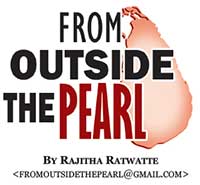 The most fascinating thing about some of the replies was that they were longer than what I had written in the first place! I try to stick to around 1000 words per column. Most of those classic literary works exceeded that meagre amount by a huge margin. They could have proudly occupied the centrefold of a newspaper. A foray into psychology makes one wonder why those people don’t write direct to the editor, is it because they don’t wish to disclose their identity and hide behind the anonymity of the internet or is it due to a lack of self-confidence …?
The most fascinating thing about some of the replies was that they were longer than what I had written in the first place! I try to stick to around 1000 words per column. Most of those classic literary works exceeded that meagre amount by a huge margin. They could have proudly occupied the centrefold of a newspaper. A foray into psychology makes one wonder why those people don’t write direct to the editor, is it because they don’t wish to disclose their identity and hide behind the anonymity of the internet or is it due to a lack of self-confidence …?
Anyway, why is this a debate at all? The esteemed house of representatives of the Democratic Socialist Republic of Sri Lanka has sworn in a convicted murderer as an MP. Now does this mean that a dual citizen of another country is automatically classed as having committed something more than a capital crime? The Pearl has hit the headlines all over the world for another spectacular achievement! What’s more the “highly literate” population voted this man in. Holy c…! This really defies any further comment. Does it also mean that not a single member of the overcrowded house of representatives has enough self-respect to RESIGN and say that he or she doesn’t want to be classed as a criminal by association? This action or inaction as the case may be, finally allows me to “rest my case” and be assured of victory when I say that not one single member of parliament is worth her or his salt.
Can I move on to another favourite subject of mine, the decimation of the UNP. I read the other day that another nephew has been lined up to be groomed for leadership of the Uncle Nephew Party. What utter rubbish! Don’t the people who make these decisions realize that actions of this nature are what have led to the destruction of the party? Or on the other hand has the wily fox set somebody up for the high jump? Tell you what, having watched the man in action, I would be very careful if I was the chosen nephew.
I say give the leadership to someone else. Preferably, someone from outside the party. Someone with a proven track record of leadership and ability to organize a team and instil the will to win. How about one of two people in the whole of the Pearl who has a world class achievement under their belt? We have one person who won the Cricket World Cup and another who has destroyed one of the most powerful terrorist networks of his time. What are these people doing now? They are largely ignored and not given any sort of recognition by the very people who vote murderers into parliament and make howls of protest when dual citizens are considered for high office.
Give the UNP to the Field Marshall I say, if he is interested, and make sure that Captain Cool is his deputy. Then at last we may have a future for our beloved ex pearl of the Indian Ocean. A future with a home-grown leadership and no requirement for dual citizens. The type of leadership that may even cause a brain drain in reverse, like what is happening in Aotearoa at present.
The real estate market is going berserk by all accounts in Aotearoa. Many expatriates who have been doing highly paid jobs are coming back. They are buying houses on line, without even physically looking at them. Could be due to control of Covid-19 in NZ and the current level of communications that allow anyone to work from almost anywhere? However, there must be at least a modicum of belief in the governance of the country and the direction we are being steered in. This is home grown leadership and from people who do not have even the semblance of the track record and achievements that the aforementioned gentlemen from the Pearl have.
No, we don’t recognize achievements in the Pearl, do we? We admire thuggery and accept allegiance and oaths of loyalty from convicted murderers.
Features
Inconsistencies and disconnects

by Nadeem ul Haque and Shahid Kardar
THERE are contradictions in the policies being pushed by the IMF in the latest programme. While it played a crucial role in liberalising the economies of the communist bloc, it now appears to support heavy-handed regulation and price controls in a developing country like Pakistan. Such inconsistencies raise questions about the adaptability and relevance of IMF programmes in different contexts.
In our case, the domestic market continues to influence the pace, pattern and level of growth. Policies are focused on protecting an industrial structure that produces low productivity/ low value-added goods. The growth of one industry has created a market for another — flourishing with varying degrees of inefficiencies. The result is that all such markets have grown together.
The outcome is a formal private sector whose habits and investments have not changed over time. Exporting a similar range of goods (with modest upgrading to higher value-added goods) depends on subsidies and concessions.
We believe Pakistan needs a comprehensive policy overhaul, moving away from excessive regulation and a tax-first approach towards a strategy that promotes market development, innovation, and economic productivity.
For this transformation to take place, greater engagement with local research and institutions is necessary. The findings of the Pakistan Institute of Development Economics (PIDE) suggest that Pakistan’s economy is being held back by structural flaws, not simply low tax revenues or energy pricing issues. Decentralising governance, reforming tax policy, and removing barriers to trade and investment are key to a more vibrant, competitive economy. International partners, including the IMF, must recognise these local realities and align their strategies accordingly.
Energy losses have brought the economy to its knees with the IMF’s only proposal being to increase prices to cover losses and hide inefficiencies. Not once has the IMF accepted that the need of the hour, as shown by local research, is to activate the market system, which has been on the anvil for almost 20 years.
The energy sector remains highly centralised; it is a one-buyer one-seller (government) model, with an outdated uniform pricing system that relies on cross-subsidies and prevents the development of competitive markets.
Perhaps the most central issue is the extreme centralisation of power within government and bureaucracy. A few civil servants wield disproportionate control, undermining the growth of key sectors like education, energy, and infrastructure. Energy losses can only be eliminated if the system is configured as independent units operating in a market. The IMF, however, has set up impossible goals such as privatising huge energy monopolies without an adequate regulatory framework and capability and allowing market forces to operate.
In 2024, the government is still trying to control prices through the bureaucracy. The IMF is silent on this key issue. With the fall of the Soviet bloc, we thought this issue had been dealt with and that the world had learnt price controls don’t work. Should the IMF not settle this issue of price controls in a programme?
As argued earlier, the governance system itself incentivises rent-seeking and political loyalty over merit and efficiency. Public resources are misallocated, and government officials benefit from a system that rewards perks like subsidised housing and overseas assignments instead of transparent cash salaries. PIDE suggests that a simple reform — monetising these perks into one transparent salary structure — could potentially unlock billions of dollars in investment by freeing up valuable real estate currently occupied as housing by government officials. In Islamabad alone, this reform could attract an estimated $55bn in investment, with similar potential in the other major cities.
The IMF and international partners have insisted on energy price hikes for over two decades, largely ignoring the fact that the problem is more about underlying issues of poor governance and mismanagement than inadequate pricing. Despite repeated calls for reforms that allow the market to work and take the centralised bureaucracy out of the power sector, no significant changes in management practices were implemented. Similarly, in the tax system, the focus has been on extracting more revenue, without addressing the convolutions of an inherently unstable tax structure and a rapacious regulatory environment or exploiting the opportunities for leveraging digital tools to facilitate compliance.
This disconnect between the IMF’s policies and realities on the ground has been exacerbated by a lack of engagement with local research. The IMF’s recommendations often seem more aligned with abstract economic models than, as argued in an earlier piece, with the economy’s on-the-ground complexities. For example, the IMF has continued to overlook local arguments that underline the absence of decent public services — even something as basic as security of life and property — and the unfair, unwieldy tax structure implemented by a predatory administrative machinery as key reasons for widespread tax evasion.
Fund programmes appear to be designed with no attention to investment. Through most programmes, the investment rate has been very low — an average of less than 15 per cent of GDP, while other growing economies average over 25pc of GDP. Why is our investment so low? The most important factors have been listed above and mentioned earlier.
If only the IMF had considered the trade-off between austerity measures and the sacrifice it demands from growth, confronted by a situation of high rate of unemployment with all its social implications, they would have arrived at the need to deregulate the economy, decentralise governance, get the government out of the habit of fixing prices and develop markets without bureaucratic interference. Additionally, it would try to seek open economy policies with a stable market-based undervalued, not overvalued, exchange rate.
A little humility is needed in the IMF and increased engagement with local research. Currently, it is captured by forces that want centralisation and a rent-seeking, controlled, non-market economy. Rather than chasing taxes with fickle and extractive policies like the Sheriff of Nottingham (and hope, in vain, that improved governance follows), perhaps the IMF could join those forces that are demanding serious reform for investment and growth. That is our only way out.
(The Dawn)
Nadeem-ul-Haque is former VC PIDE and deputy chair of the Planning Commission.
He is currently director at the think tank Socioeconomic Insights and Analytics.
Shahid Kardar is a former governor of the State Bank of Pakistan.
Features
Socks pulled knee high; advice to smirk at

 Cass means here the metaphorical socks of government servants in general. Particularly in the last couple of months many officers in government departments were not working even at half or quarter steam when they really should be at full steam when at their office desks, doing their work with as much speed and power as possible, as the idiom defines.
Cass means here the metaphorical socks of government servants in general. Particularly in the last couple of months many officers in government departments were not working even at half or quarter steam when they really should be at full steam when at their office desks, doing their work with as much speed and power as possible, as the idiom defines.
Many persons who went to get work done at a government office were treated with the least amount of courtesy, nay outright rudeness; were sent from pillar (this officer) to post (that officer) with much time wasted accompanied by frustration. In the good old days, when almost all did the job they were paid to do, government officials were named public servants. Then the rot set in, inflated by overstaffing in most offices, which meant work was passed from one to another, dis-service rather than due service given.
Now, with the larger system changed by the election of a new President and the appointment of an efficient PM and the other sole Cabinet Minister, work systems have changed all for the better. Two examples to prove my point.
A person, on behalf of a future tourist friend of mine, went to a certain office to get info on permits to visit places of cultural heritage in the country. He was greeted as Mahathaya and all his queries answered well and fully, so he emerged in no time satisfied; surprised, too, at the service he got.
A niece returned from a holiday in the UK on an Emirates flight, which disgorged about 300 at the Katunayake airport. Coming in from the duty-free shop she saw long queues at the entry visa processing area. Soon, a superior officer came along, waved her to follow him and, hey presto, extra cubicles with visa stamping officers appeared, so totally the desks added to around ten.
She was out of the airport in no time, after having been given very polite service and warm welcome smiles. Remember the queues formed when the new visa issuing system was started by some foreign conglomerate under Minister of National Security, Tiran Alles? The loud protest of an incoming Sri Lankan went viral on social media.
Usually, this euphoric state lasts a couple of months following the installation of a new government and the inertia and laissez faire attitude of public servants returns. We expect not this time. We feel the change in attitude and work ethic will continue. Did not President A.K Dissanayake address persons of a certain workplace and tell them in no uncertain terms it had to be work or be sent out?
Veteran politician’s recent advice
Heard and read ex-President Ranil Wickremesinghe’s advice to the public to cast their votes in favour of experienced politicians at the November general elections.
Good advice from an experienced politician but why the resulting smirk as expressed in my title? I quote RW from the news item in The Island of Monday 21: “In these difficult times it is vital that we have leaders in parliament who know how to handle an economic crisis.” He urges voters “to think across party-lines to support candidates who worked alongside him in the past two years as they played a key role in the recovery process and have the necessary experience. Underscoring the strength of the coalition that supported him at the last presidential election (sic in capital letters) he said: ‘I took over the leadership of the country at a time it had declared bankruptcy. At this juncture politicians of the UNP, Podu Jana Eksath Peramuna and SLFP came forward to shoulder that responsibility with me. They are now united under the New Democratic Front in the parliamentary race. They have proven experience the current times demand from them as members of parliament.’”
Approval anathema to us Ordinaries
Why does the expression ‘losing one’s marbles’ come to mind? Why does Cassandra use the adjectives unseemly, inappropriate, foolish, unwanted, to qualify ‘advice’?
There are so many coalitions of parties formed that Cass had to refer up membership of the New Democratic Front (NDF). Found the following top in the national list of the NDF: Dinesh Gunawardena, former speaker Mahinda Yapa Abeywardena, Faizer Mustapha, Tiran Alles, Ravi Karunanayake and Thalatha Athukorala.
So, RW recommends people to vote for such as those above, some associated with dishonesty and chicanery. To vote so they help straighten the economy of the country! One cannot help but remember others who were in his team, whether now in the New Demo Front or clinging onto other parties. Many characters within the 225 whose ouster was a battle cry of the Aragalaya are afloat in this election period. However, Cass singles out just three of them for mention: Rohitha Abeywardena, Mahindananda Aluthgamage and Prasanna Ranatunge who were his cabinet ministers and got him to contest the presidency as an independent candidate.
Bit of dung in pot of curd
Most Lankans are now strongly in support of AKD as President of this country. He has stepped forward very correctly so far. Thus, when Cass read a news item in The Island of Tuesday October 22, she read it three times over and ended up startled. Did he really say it? The title of the front-page report was: “General election: AKD wants one party rule – there is no need for an Opposition in Parliament”, reported by seasoned journo Shamindra Ferdinando.
Cass’ wondered whether he had been misquoted? Did he mean less of an opposition, more on the government side? Or did he mean the NPP will oppose themselves if their majority do not agree to new bills and rules?
The NPP wants a one-party rule. That generally is what a ruling party aims at but not at all what the citizens want. We have heard, agree and echo that the NPP should not get 2/3 seats or more in the House. A strong opposition is an essential necessity.
Features
BRICS taking centre stage in new world order
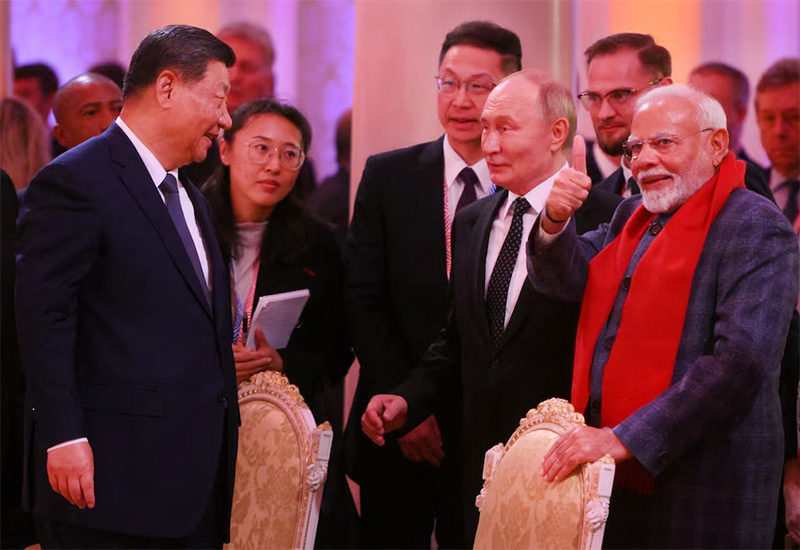
 A rush is on among numerous countries of the South to be members of the heavyweight BRICS grouping. This is a clear indication that these hopefuls are soundly perceptive of the changing balance of international economic and political forces.
A rush is on among numerous countries of the South to be members of the heavyweight BRICS grouping. This is a clear indication that these hopefuls are soundly perceptive of the changing balance of international economic and political forces.
Quite rightly, the latter states want to benefit from emerging, BRICS-centred economic growth prospects in particular and are fashioning their foreign policies accordingly. However, it is apparent that among some of these hopefuls, politics is proving as important as economics. Palestine, Syria and Myanmar are some cases in point.
For all intents and purposes, BRICS is the Southern answer, so to speak, to the hitherto North-centred international political and economic order. Quite rightly, it is seen as an effective challenger to the dominance of the G7. If the world’s hapless and vulnerable, such as Palestine, are aspiring for BRICS membership, the inference is inescapable that they are compelled to do so by their current powerlessness. That is, politics is primarily at the heart of their BRICS-related decision.
Since the US and its allies are firmly behind Israel, Palestine has no choice but to seek the security guarantees that BRICS may be seeming to offer it. Such considerations apply to most other powerless Southern states intent on gaining BRICS membership.
That is, the North is failing to meet some of the cardinal expectations of the more vulnerable countries of the South. Needless to say, the latter are right in their assessment since it would not be too long before BRICS surpasses the G7 in economic, military and political strength.
No less a quarter than the UN recognizes that the old order is fast changing and that BRICS would be a global formation to contend with in time to come. This possibility is underscored by UN Secretary General Antonio Guterres’ presence at the ongoing BRICS Summit in Kazan, Russia. Herein we have an important endorsement of a BRICS-centred world order that is fast replacing the West-dominant international political order that came into being close on the heels of the ending of World War Two which the UN itself was instrumental in installing.
The rush on the part of Southern states to acquire membership of BRICS is understandable in view of the poor development prospects of most Southern states currently but there could be some perils in the latter allowing economics to crowd out politics completely.
This applies mainly to those countries of the South that desire to tread the path of democratic development. Put simply, they would need to guard against endangering their democratic identity in the process of being dependent for their economic sustenance on principal BRICS members that are authoritarian and autocratic. Unfortunately, only India could be described as a vibrant democracy from among the founding fathers of BRICS, for instance.
To be sure, the more powerless Southern states are unlikely to be pressurized in a major way, in the short and medium terms, by the foremost powers of BRICS to refashion their political and economic systems to be in keeping with the predilections of the heavyweights of the grouping, but prolonged economic dependence on the latter by the vulnerable could have the effect of compelling the latter to cave into pressures exerted by the powerful. That is, the democratic credentials of the vulnerable and ‘small’ may eventually come to be compromised. That most threadbare cliché; ‘There’s nothing called a free lunch’, remains relevant.
The above considerations point to the need for balanced, nuanced and farsighted foreign policy initiatives on the part of the vulnerable and powerless. They would need to be committed to Non-alignment, which should be understood as a policy of cordiality towards all countries. From this viewpoint, the powerless would need to be on equal cordiality with both South and North.
Equally importantly, the South would need to ensure that it is on a path of democratic development. Since there is no advisable alternative to the latter at present, democratic development, which translates into growth with equity in all conceivable respects, remains the only policy ‘trajectory’ to traverse.
Sri Lanka has made the notable decision to seek membership of BRICS, and this initiative cannot be faulted, but the country needs to ensure that it remains a representative democracy. This observation is prompted by a recent comment made by Sri Lankan President Anura Kumara Dissanayake (AKD) to the effect that, ‘There is no need for an Opposition in parliament’.
President AKD needs to be reminded that a parliament minus an Opposition is unthinkable in what is considered a representative democracy. Such a situation would smack of a totalitarian regime; an antithesis of democracy. This way forward all right thinking Sri Lankans are likely to reject totally.
Accordingly, the weaker states of the South should ensure for themselves stepped-up growth by virtue of future BRICS membership, but it would be enormously counter-productive for these countries to barter away their democratic identity for the sake of material prosperity. Thus, growth with equity remains the desired development ideal.
Achieving this ideal is no uphill challenge. Social democracy or growth with equity has not proved difficult to achieve for countries such as Germany. It is also encouraging to note that Great Britain is currently, to a good measure, social democratic in orientation under its Labour government. Many are the Scandinavian countries that are taking this road to development. But the majority of these states remain democratic in their essential character.
The onus is on the governments of the South to ensure that their populations are in a position to access the essentials of living: food, water, shelter and sound health care. Interestingly, such access is most possible only under representative and accountable democratic governments. This has been the world’s experience. Thus, while getting the best out of BRICS membership it would be in the best interests of the peoples of the South for their governments to work within a social democratic governance framework.
Moreover, the South would do well not to lose sight of the fact that Europe and Asia are continuing to be vibrantly interdependent in the field of trade, to consider just one dimension in international economic development. Currently, the South cannot do without the North in this area and vice versa. It would be naïve on the part of the South to lose sight of these facts, going forward.
-
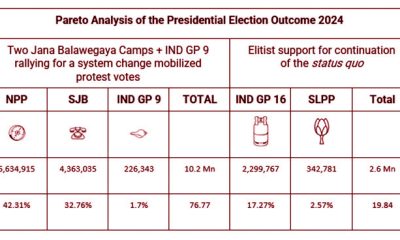
 Opinion6 days ago
Opinion6 days agoA Pareto analysis of ‘Jana Balawegaya’ force
-

 Editorial3 days ago
Editorial3 days agoProbe reports, skewed logic and emerging threats
-

 Editorial7 days ago
Editorial7 days agoWere the right questions asked?
-
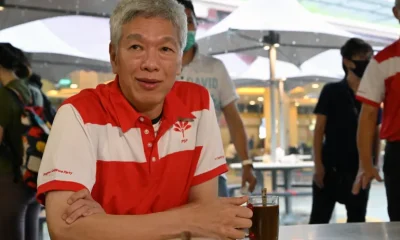
 Foreign News4 days ago
Foreign News4 days agoLee Hsien Yang, youngest son of Singapore founder, claims asylum in the UK
-
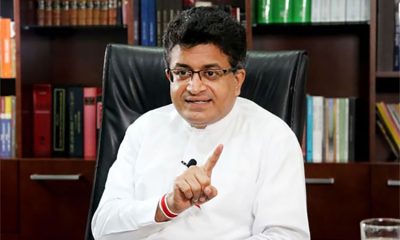
 News2 days ago
News2 days agoGammanpila challenges Minister Herath over allegations against former judge
-

 Sports2 days ago
Sports2 days agoSri Lanka riding high on an impressive run
-

 Features7 days ago
Features7 days agoKumar David: An Accomplished Academic and a Broadminded Marxist
-

 Features6 days ago
Features6 days agoRelevance of a neutral foreign policy











